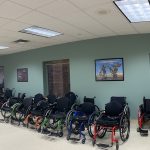The University of Pittsburgh and Children’s Hospital of Philadelphia (CHOP) have formed a new partnership to support the development of promising medical devices that address unmet critical needs. As a result, the Philadelphia Pediatric Medical Device Consortium becomes the Pennsylvania Pediatric Medical Device Consortium (PPDC) to reflect its statewide reach.
This expansion comes on the heels of a five-year, $6 million grant renewal from the consortium’s sponsor, the U.S. Food and Drug Administration.
The PPDC has assisted more than 60 innovative projects and awarded 16 seed grants of up to $50,000 each to companies in the Philadelphia region and beyond.
The consortium’s new cross-state partners are the McGowan Institute for Regenerative Medicine and sciVelo, both based at the University of Pittsburgh. Together, these programs focus on developing and commercializing biomedical technology.
“Our new partnerships with these outstanding programs build on our existing success in collaborating with Drexel University and the University of Pennsylvania,” said Dr. Matthew Maltese, director of biomechanics research in the Department of Anesthesiology and Critical Care Medicine at CHOP, and the executive director and principal investigator of the PPDC. “This unification of Pennsylvania’s biomedical ecosystem expands the PPDC’s network of expertise in supporting the development of much-needed devices for children.”
“We are extremely excited to offer our resources and expertise as we work together with UPMC Children’s Hospital of Pittsburgh, Children’s Hospital of Philadelphia and sciVelo to develop medical device technologies for children with particular unmet medical needs,” added Dr. William R. Wagner, director of the McGowan Institute.
Recently, the American Academy of Pediatrics urged the development of medical and surgical devices custom-designed for children, rather than depending on the off-label use of tools invented for adults.
Since its first round of awards in 2015, the PPDC has provided seed funding for a range of pediatric products, including an airway clearance system, a powered arm brace, a speech-generating communication system, a vision acuity test for preverbal children and a portable phototherapy device for newborns with neonatal jaundice.
The PPDC will announce its next round of seed grants early this year. In addition to its annual round of seed grants, the consortium accepts applications year-round for in-kind services and expert advice.
For more information on the PPDC, visit https://ppdc.research.chop.edu.









